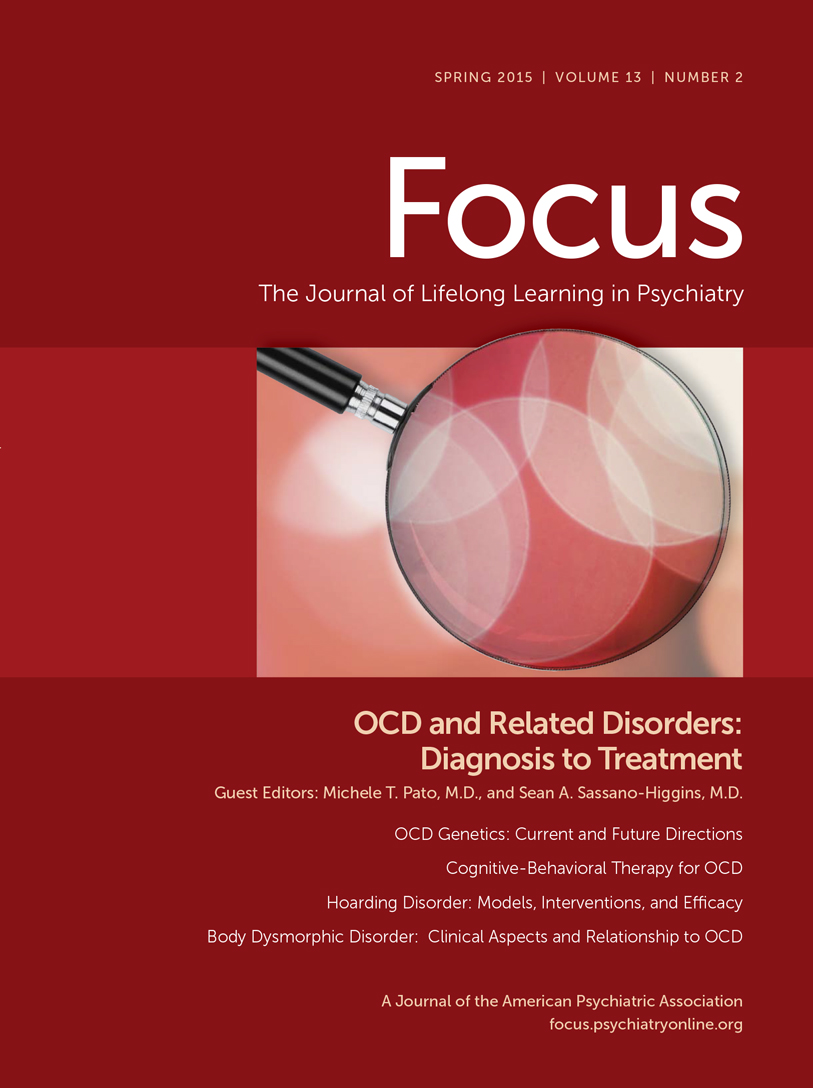From the Guest Editors: Obsessive-Compulsive and Related Disorders
It is with great excitement that we note that the obsessive-compulsive and related disorders have been given their own chapter in the fifth edition of the Diagnostic and Statistical Manual of Mental Disorders (DSM-5). In this issue of Focus, outstanding authorities on obsessive-compulsive disorder (OCD), hoarding disorder, trichotillomania, excoriation disorder, and body dysmorphic disorder discuss recent findings in the research literature and provide their perspective on diagnosis and treatment.
The creation of this new chapter in DSM-5, along with the development of this special issue of Focus, reflects an increasing understanding of the nature and relatedness of these disorders. Although these disorders are related, there are important differences in treatment strategies. Throughout this issue, the authors discuss differences in symptoms that will assist the clinician in correctly diagnosing and treating the patient.
The disorders presented in this issue are often difficult from a diagnostic standpoint. For example, one form of OCD involves the presence of intrusive thoughts or images of death or losing control and harming another individual. These are certainly frightful symptoms to hear about from the clinician’s point of view. However, if these represent the intrusive thoughts or images that can be part of the obsessions and compulsions of OCD, an important crossroads is reached in terms of treatment options. Although these symptoms can often be managed in an outpatient setting, if the clinician has not been trained to recognize them as OCD, hospitalization for being a danger to self and/or others is likely to ensue. The authors can recall several instances when, had the correct diagnosis of OCD or a related disorder been made, involuntary hospitalization could have been avoided, and a more beneficial course of treatment, including serotonin reuptake inhibitors and cognitive-behavioral therapy (CBT), could have been implemented. Sufficient training in these disorders (as we hope this issue will help provide) will not only reduce the time to accurate diagnosis but also allow the patient to begin effective treatment more quickly.
This issue contains a review of the existing data on genetic markers of OCD and optimism for what can be accomplished in the near future. The genomics of OCD remains a nascent body of research, but as with other disorders, the authors hope that psychiatry will one day be able to identify genes that will assist with treatment planning for patients with this group of disorders.
Psychotherapy, especially CBT, continues to show a robust treatment response. We would urge those interested in treating OCD and related disorders to seek additional training beyond that required in residency and to keep abreast of new findings. It is our opinion that psychiatrists can be excellent psychotherapists as well as pharmacotherapists. As a number of articles in this issue report, there are important nuances to CBT and psychotherapy treatment that one might consider depending on whether the diagnosis is hoarding, body dysmorphic disorder, or general OCD.
We hope that through this issue, interest to learn more is sparked in the clinician. This can only serve to improve patient care, which is truly the ultimate goal of our work as clinicians.



